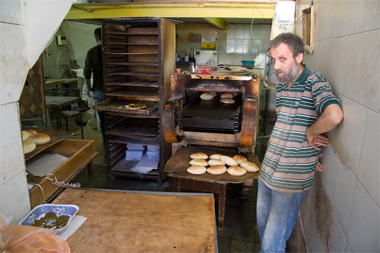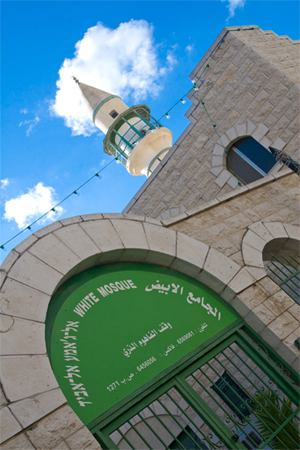David Landis
dplandis@mosaicmennonites.org
 In the morning I often go into the old Nazareth market to buy fresh pita bread for breakfast, where a small bakery is located on the corner near the White Mosque. The bakery is a maze of clockwork conveyor belts that passes dough through the oven, depositing hot puffed pita balloons onto the tray below, where I can watch them deflate as they cool. The store is run by a hunched-over greying Muslim man with glowing eyes. He speaks English well and is always friendly when I come to buy my daily bread.
In the morning I often go into the old Nazareth market to buy fresh pita bread for breakfast, where a small bakery is located on the corner near the White Mosque. The bakery is a maze of clockwork conveyor belts that passes dough through the oven, depositing hot puffed pita balloons onto the tray below, where I can watch them deflate as they cool. The store is run by a hunched-over greying Muslim man with glowing eyes. He speaks English well and is always friendly when I come to buy my daily bread.
The other day when I went to get a pita pizza at the bakery, I decided to take an opportunity to practice my developing Arabic skills. I began with Marhaba (hello), and he responded, Keef halak (how are you doing?). After I replied Mabsut (good), he corrected me by stating that I should say instead, Hamdu l’Allah, meaning “Thanks be to God.”
He asked me how we should respond to this and I ventured, Allah Akbar, meaning “God is greater.” Happy with my correct reply, he went on to tell me that we should first thank God before saying we are doing well because God is greater than what we want or how we are feeling. He reminded me it is because of God that we can do well, as God is greater and we must submit with gratitude.
The White Mosque was originally constructed to foster better relations between Christians and Muslims in Nazareth. A blessing of accountability was given to the mosque, indicating that if a Muslim preacher ever spoke against the Christian community in Nazareth, the minaret would crash to the ground and destroy the building. To this day the mosque stands near the center of the Old Market, where many come to converse, trade, and interact.
 I am challenged by the initiative of the Muslims of Nazareth to extend a hand of coexistent hospitality to their Christian neighbors. I am encouraged by the 138 Muslim scholars, clerics, and intellectuals who came together in October to unanimously declare the common ground between Christianity and Islam in a historic document entitled, “A Common Word Between Us and You.” Their invitation to the global Christian community is that we take Jesus’ two greatest commandments seriously, to love God and to love our neighbors.
I am challenged by the initiative of the Muslims of Nazareth to extend a hand of coexistent hospitality to their Christian neighbors. I am encouraged by the 138 Muslim scholars, clerics, and intellectuals who came together in October to unanimously declare the common ground between Christianity and Islam in a historic document entitled, “A Common Word Between Us and You.” Their invitation to the global Christian community is that we take Jesus’ two greatest commandments seriously, to love God and to love our neighbors.
Learning a new language is a humbling experience; one that teaches much about the contexts and cultures of our neighbors’ lives. It is a deliberate decision to learn to love what is unfamiliar and greater than ourselves, which directs our attention to God.
Choosing a humble learner’s approach is the act that begins the process of mutual understanding, the essential initial building blocks of peacemaking through transformational relationships. This is the bridge to taking the next difficult step that Jesus requires of us, to love our enemies as well as our neighbors.
By living in a place where I am required to interact with Jews, Muslims, and Christians on a daily basis in order to go about my life, I am continually learning that indeed, God is greater than our differences. Open and honest relationships, like God, acknowledge and transcend the labels we have constructed to separate ourselves from each other. The invitation to love our neighbors is open and awaiting our participation.
For more information on the letter “A Common Word Between Us and You” sent October 13, 2007 and the Mennonite Church USA response visit: Mennoweekly.org
Photos by David Landis
The opinions expressed in articles posted on Mosaic’s website are those of the author and may not reflect the official policy of Mosaic Conference. Mosaic is a large conference, crossing ethnicities, geographies, generations, theologies, and politics. Each person can only speak for themselves; no one can represent “the conference.” May God give us the grace to hear what the Spirit is speaking to us through people with whom we disagree and the humility and courage to love one another even when those disagreements can’t be bridged.
